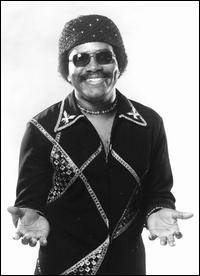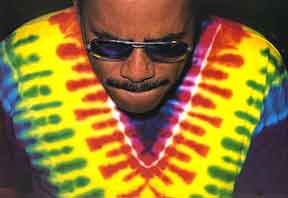Jazz Musician - Lonnie Liston Smith
 Lonnie Liston Smith an active member of Lambda Gamma Gamma Chapter (Ft. Meade, Md.) is one of contemporary music's most versatile musicians. In a career that spans some 25 years, he has been headlined in a variety of recordings as a featured sideman for some of Jazz music's most illustrious leader's before stepping out to reveal his own original concepts as a bandleader in the mid 70s. He is a keyboardist of the first rank and has influenced a generation of young players who have acknowledged his rhythmic (swing), harmonic acumen and composing skills.
Lonnie Liston Smith an active member of Lambda Gamma Gamma Chapter (Ft. Meade, Md.) is one of contemporary music's most versatile musicians. In a career that spans some 25 years, he has been headlined in a variety of recordings as a featured sideman for some of Jazz music's most illustrious leader's before stepping out to reveal his own original concepts as a bandleader in the mid 70s. He is a keyboardist of the first rank and has influenced a generation of young players who have acknowledged his rhythmic (swing), harmonic acumen and composing skills.
Lonnie was born in Richmond, Virginia into a musical household -- his father was a member of the Gospel Harmonizing Four. From a very early age, Lonnie remembers such groups as the Swan Silvertones and the Soul Stirrers with Sam Cooke being frequent visitors. There was a piano in the house and he began investigating its sound before receiving formal instructions a few years later. It was during high school that Lonnie became enamored with modern Jazz through hearing alto saxist Charlie Parker, one of the seminal figures in the music. It was not long before he was listening to Miles Davis (a future employer), as well as John Coltrane. Not surprisingly, he patterned his keyboard style after innovative horn players, and not the many fine pianists around. Of course, he was aware of artists like McCoy Tyner, Wynton Kelly, Bud Powell, Horace Silver, Sonny Clark, and Thelonius Monk, but made a deliberate effort not to mimic their

Beginning his career gigging in the Baltimore area as a teenager, Lonnie became adept at backing vocalists such as Ethel Ennis and visiting dignitaries like Betty Carter. While attending Morgan State University, he woodshedded with his peers, Gary Bartz (alto), Grachan Moncur (trombone), and Mickey Bass (bass). At the time, Mickey was gigging with drummer, Art Blakey and recommended Lonnie for the band's piano spot. He ventured to New York with Blakey's Jazz Messengers, which brought him significant visibility and the opportunity to record with the band. Next, Lonnie went with drummer Max Roach, which was unusual, as he rarely used a piano in his ensemble. Unfortunately, his year with Roach was not documented on vinyl, but these gigs did elevate his status as one of the up and coming players on the scene. He then enjoyed a 2 year stay with Rahsaan Roland Kirk, which was documented by "Don't You Cry, Beautiful Edith" on Verve and "Here Comes The Whistleman" on Atlantic.
Source: http://www.lonnielistonsmith.net/bio2.htm. 4/12/2008